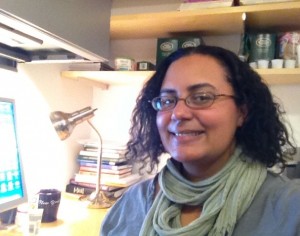Gabriela had been aware of AAUW for a while, and she was especially impressed by their commitment to the kinds of non-traditional challenges that women, in particular, face in obtaining advanced degrees and advancing their careers. Her first memory of becoming aware of AAUW was when she was looking for potential places where she could receive financial support for her doctoral dissertation a few years ago. She remembers feeling that the kinds of issues she was interested in addressing in her dissertation would be of interest to an association so deeply committed to women and helping to address the complex challenges they face in their education and careers.
Gabriela first made formal contact with the association when she applied for the American Dissertation fellowship, which she received this year.
The process of applying for the fellowship seemed straightforward, especially since the issues addressed in her dissertation were so in line with the mission, as she understood it, of AAUW.
She recalled that some aspects of the online application were a bit buggy, so she thought that if the online application were a bit easier to copy and paste to from MS Word, that would help out with some of the technical issues tremendously.
Since AAUW is passionate about gender equity and her research is focused on gender equity and inclusion when it comes to educational environments, media, and technology, she expected to have ongoing participation and connection with AAUW. Over the past 3 years, her research has explored inequity in digital games, gaming culture, technology and media to inform the design of equitable educational media and learning environments built around games. Given that digital games and certain kinds of media and technology can be inequitable in design, production and the kinds of user and playing environments that result from them, Gabriela has felt that these environments can be stereotype threat inducing and subject to implicit bias that disproportionately disenfranchises females and minorities. The recent AAUW report, Why so few?, found similar connections in science, technology, engineering and math (STEM) environments. The idea with her research is that we have to be attuned to the ways that popular media and technology differentially affect females from pursuing STEM (since past research shows a high correlation between computer and digital game use and STEM careers), as well as how we design educational media and technology to be sensitive to these complexities and overall inclusive. She expects that this research will continue to speak to AAUW’s mission and she hopes we can continue to have a dialogue around research and innovation that is gender inclusive and encourages gender-equity in STEM.
The fellowship has been tremendous in helping her achieve her educational goals thus far because she have been enabled to pursue her dissertation full-time, something she would not have been able to do without the fellowship. Gabriela’s dissertation study is a complex analysis of the contextual factors we need to be aware of when we design educational media, in order to ensure it is as gender-equitable as it can be. The complexity of this level of investigation, which is multi-tiered, from participant observation, to interviews and surveys, requires a lot of time and dedication to writing, which she would not have had without the fellowship. Also, since this is her final year of doctoral studies, she has also been able to devote a significant amount of time to job applications, which she would not have been able to do without this support.
Gabriela’s primary objective during this fiscal year and beyond is to explore and understand the ways media may be inequitable, particularly around representation and experience, as well as how we can design technology-mediated environments (especially games) in inclusive ways. She is especially passionate about how emerging media and digital games for learning can be inclusive, equitable and educational, as well as the complexities around that kind of design.
Research and news media are beginning to emerge around inequity and harassment in game culture, and Gabriela thinks her research speaks to a larger dialogue on the consequences of technology-mediated inequity in long-term career goals, and education. For example, researchers like Yasmin Kafai at the University of Pennsylvania, and other colleagues and contemporaries have tried to understand how we can develop technology and media to be equitable to women and girls, both through the ways they are represented and the ways they are enabled to program and develop with inclusive tools. This research and her research speaks to education more broadly to include formal and informal environments and the ways those environments and tools can affect individuals from choosing certain kinds of careers or developing the right kinds of confidence and expertise required to succeed or persist in those careers. This is an area of research, which is still ripe for exploration and development (particularly in understanding the intersections between gender, ethnicity and sexuality), and she hopes to continue to contribute to that dialogue, through research and teaching.
Ideally, she would like to pursue research and teaching as a professor of technology, digital media and learning. She expects that, during the next three years, she will be engaged in early-career scholarship and research, as either a postdoctoral researcher or assistant professor. In five years, Gabriela hopes to be on the tenure-track, focusing on research, mentoring, teaching and outreach that encourage gender-inclusion and meaningful learning around emerging technology and media.
Her dissertation study is an attempt to understand gendered experience with digital games and online gaming culture to inform equitable educational games and learning environments. Since research shows high correlation between gaming and computer participation and pursuit of STEM careers, research has shown that increasing female participation in gaming and computer cultures could increase their long-term pursuit of STEM. As part of Gabriela’s research, she has been a participant observer in online gaming communities (particularly female-supportive communities) for over 3 ½ years. She has also interviewed game developers, and interviewed and surveyed gamers, across gender, to understand how their experiences have shaped their identity, motivation, and self-efficacy, which are all learning-relevant constructs that will speak to effective and inclusive educational media design. For example, many female game players, significantly more so than male players, have discussed gender-based harassment in online game cultures, and sensitivity to the ways games are marketed around gender, which is often disproportionately geared toward males, and either renders females less visible or important, or hyper sexualizes them. Gabriela is seeing correlations between this lack of environmental support and the lack of efficacy and motivation to continue to participate in gaming and computer cultures (and possibly STEM, as the related literature suggests). In other words, she is finding that digital games and online gaming culture can be stereotype threat inducing, which can hinder performance disproportionately in the short term, and alienate females and minorities from wanting to engage in the long term. Also, the ways games are marketed can encourage implicit bias that may disproportionately discourage females from wanting to play games (even if they could be games they would equally enjoy) and influence families, teachers, and peers from equally encouraging female participation. In order to encourage equal support around educational games, and content that won’t disproportionately hinder performance, we have to be cognizant of the way games are designed, promoted and supported in both formal and informal educational settings. Gabriela’s work contributes to a greater dialogue on equity of experience and participation with technology, particularly focusing on how we can design for inclusion across gender.

